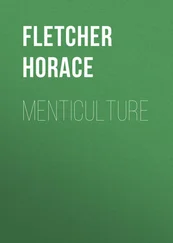Horace Fletcher - The New Glutton or Epicure
Здесь есть возможность читать онлайн «Horace Fletcher - The New Glutton or Epicure» — ознакомительный отрывок электронной книги совершенно бесплатно, а после прочтения отрывка купить полную версию. В некоторых случаях можно слушать аудио, скачать через торрент в формате fb2 и присутствует краткое содержание. Жанр: foreign_antique, foreign_prose, на английском языке. Описание произведения, (предисловие) а так же отзывы посетителей доступны на портале библиотеки ЛибКат.
- Название:The New Glutton or Epicure
- Автор:
- Жанр:
- Год:неизвестен
- ISBN:нет данных
- Рейтинг книги:4 / 5. Голосов: 1
-
Избранное:Добавить в избранное
- Отзывы:
-
Ваша оценка:
- 80
- 1
- 2
- 3
- 4
- 5
The New Glutton or Epicure: краткое содержание, описание и аннотация
Предлагаем к чтению аннотацию, описание, краткое содержание или предисловие (зависит от того, что написал сам автор книги «The New Glutton or Epicure»). Если вы не нашли необходимую информацию о книге — напишите в комментариях, мы постараемся отыскать её.
The New Glutton or Epicure — читать онлайн ознакомительный отрывок
Ниже представлен текст книги, разбитый по страницам. Система сохранения места последней прочитанной страницы, позволяет с удобством читать онлайн бесплатно книгу «The New Glutton or Epicure», без необходимости каждый раз заново искать на чём Вы остановились. Поставьте закладку, и сможете в любой момент перейти на страницу, на которой закончили чтение.
Интервал:
Закладка:
Regarding also the advice to remove from the mouth refractory substance that the teeth and saliva cannot reduce to a condition to excite the Swallowing Impulse. There is theoretical and actual nutriment in the cottony fibre of tough lobster, or poor fish, or lean pork, and there is good reason to believe that a strong digestive apparatus can take care of such tough substance after a fashion and get nutriment out of it. In the same way the hard, woody fibre of old nuts is the identical material that was rich in juicy oils and proteid when the nuts were fresh, but if swallowed in the toughened condition that age brings to nuts, it is but slowly reduced in the stomach and intestines and only at enormous expense. If putrifactive bacterial decomposition has to be resorted to to get rid of the stuff the process is then poisonous as well as difficult.
According to physiological authority which we must, for the moment, accept, proteid is a vitally-necessary material and we cannot afford to waste it. Our life depends upon proteid to replace the waste of muscular tissue which occurs with every movement, but when even good proteid is found by the mouth to be in a form that is too refractory for the teeth to handle, it is poor policy to send it on to the toothless stomach and intestines for the accomplishment of the reduction. If the mouth cannot handle what its guardian senses don't like, it can spit it out and get rid of it immediately; but if the stomach or intestines are afflicted with something that is harder than they can easily take care of, they have to call in the assistance of bacterial scavengers whose method is poisonous decomposition, and whose fee is putridity of odour penetrating the whole system and issuing at every pore, making Cologne water a large commodity even in so-called Polite Society.
There are discernible in the mouth distinct senses of discrimination against substance that is undesirable for the system. If the mouth senses are permitted to express an opinion, their antipathy is easily read. It is far safer to spit out what the natural impulse of swallowing hesitates at, or fails to suck up with avidity, than it is to force a swallowing to get rid of it simply to satisfy a prudish "table manner" objection. To avoid "impolite" condemnation we really make "hogs of ourselves" "on the sly," and vulgar slang alone is appropriate to express the shameful confession.
As a matter of fact, if one faithfully practise mouth thoroughness in connection with all his food for a term of a few weeks, he will find that the appetite ceases to invite the sort of things that have to be spit out. The appetite gradually but unfailingly inclines to foods that are profitable all the way through, and in which there is little or no waste. This revelation alone shows a delicate usefulness of Appetite that has escaped students of the human senses.
In the matter of the insalivation of liquids, evidence continues to accumulate to show that in the present prevalence of liquid or soft foods lies the great danger to the digestive economy of man. Through them, mouth work becomes neglected, and the tendency is to force the stomach and intestines to take on the work of the powerful mouth muscles and glands in addition to their own work, and in the straining that ensues trouble begins.
There is now no doubt but that taste is evidence of a chemical process going on that should not be interrupted or transferred to the interior of the body. Tried upon milk for so long a period as seventeen days, during which nothing was taken but milk, not even water, thorough insalivation secured more than a twenty-five per cent economy in actual assimilation; not alone with one subject, but with no less than five persons, living on milk from the same cow, and all of whose strict test history was recorded. It seems also to be the only way in which a practically odourless solid excreta is obtainable, and this is certainly evidence worth considering and a desideratum worth striving for.
While it is an excellent thing to give thorough mouth attention to anything taken into the body, to solids alone, even if liquids are neglected, the best economic and cleanly results are only obtained when all substances, both liquid and solid, are either munched or tasted out of existence, as it were, and have been absorbed into a waiting and willing body; a body with an earned appetite.
With liquids one simply has to do as the wine-tasters and the tea-tasters do. Small sips are intaken and the liquid is tasted between the top of the tongue (the spoon end) and the roof of the mouth until all the taste is tasted out of it, and the Swallowing Impulse has claimed it. This is by no means a disagreeable task, and as soon as the unnaturally acquired habit of greed and impatience is conquered, the reward of following this natural requirement is very great and increases with practice. Five years of experience has taught the author that a really keen appreciation of taste and its delicacy of possible refinement is not known to persons of ordinary habits of life. The pleasure which comes with conformity with the natural requirements is truly Epicurean and disregard of them is as surely gluttonous.
The author still claims discovery of a distinct physiological function which he first named "Nature's Food Filter." Van Someren preferred the name of a "New Reflex of Deglutition." It is, in fact, the "Natural Swallowing Impulse," invited only by food mechanically and chemically prepared for passing on to the interior, call it by whatever name you like or may.
At the time this little book was first published, the only note in favour of giving special attention to "buccal digestion," that had been sounded, was the advice of Mr. Gladstone to his children, "Chew your food thirty-two times to each mouthful," or words to that effect. The "Masticate well" prescription of the physician when given at all, had meant little or nothing, to either the patient or to the prescriber, except that one must not swallow hard food whole.
For two years after its publication little heed was given to the suggestion because the author happened not to be a medical man, but, finally, the reserve of indifference was broken, first by Dr. Joseph Blumfeld, in a review of the book in the London Lancet , and soon after by Dr. Ernest Van Someren of Venice, Italy, an English physician residing and practising in Venice. Dr. Van Someren's interest and experience are best stated in his own words , as follows:
THE PERSONAL "CASE" AND
"ENDORSEMENT"
of
DR. ERNEST VAN SOMEREN
"My dear Mr. Fletcher:
"It would be almost àpropos to send you, as an endorsement of your principles, the dictum of the ragged and dirty tramp in the advertisement of Pear's soap. I would have to amend it slightly and say: 'I used your { principles soap} three years ago; since when I have used no other.' I say ' almost àpropos ' advisedly, for, while the soap claims to keep the outer man clean, the practice of your principles justly claims to keep the inner man sweet and clean, so lessening the need to cleanse the outer man!
"A well-known English surgeon (I think Sir Wm. Mitchell Banks) recommends physicians and surgeons to take a leaf from the book of patent-medicine vendors, and make their patients testify to their successful treatment. I will take the hint and give you, as my 'doctor,' a testimonial of how personally I am benefited by your advice.
"Three years ago, when I first met you, though under thirty years of age, and myself a practising physician and surgeon, I was suffering from gout, and had been under the régime of a London specialist for the treatment of that malady. Though vigorously adhering to the prescribed diet, I suffered from time to time. My symptoms were typical – paroxysmal pain in my right great toe and in the last joints of both little fingers, the right one being tumefied with the well-known 'node.' From time to time, generally once a month, I suffered from incapacitating headaches. Frequent colds, boils on the neck and face, chronic eczema of the toes, and frequent acid dyspepsia were other and painful signs that the life I was leading was not a healthy one. Yet I was accounted a healthy person by my friends, and was, withal, athletic. I fenced an hour daily, took calisthenic exercises every morning, forcing myself to do them, and I rowed when I obtained leisure to do so. In spite of this exercise and an inherent love of fresh air, which kept all the windows of my house open throughout the year, I suffered as above. Worse still, I was losing interest in life and in my work.
Читать дальшеИнтервал:
Закладка:
Похожие книги на «The New Glutton or Epicure»
Представляем Вашему вниманию похожие книги на «The New Glutton or Epicure» списком для выбора. Мы отобрали схожую по названию и смыслу литературу в надежде предоставить читателям больше вариантов отыскать новые, интересные, ещё непрочитанные произведения.
Обсуждение, отзывы о книге «The New Glutton or Epicure» и просто собственные мнения читателей. Оставьте ваши комментарии, напишите, что Вы думаете о произведении, его смысле или главных героях. Укажите что конкретно понравилось, а что нет, и почему Вы так считаете.












